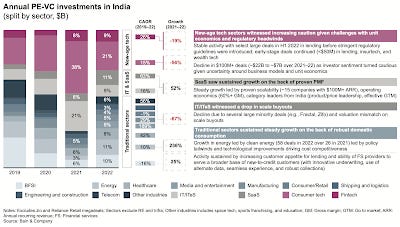In a country with scarce investible savings (financial, long-term, and risk capital), there is an opportunity cost to such resource allocation, even if market-directed. Is this a good use of the scarce savings? Are more productive economic activities being displaced by this allocation of consumption on this convenience? Agreed that foreign capital will flow into areas where it perceives high returns. But to the extent that this foreign capital also leverages domestic capital, are the disproportionately large flows into these 'convenience' sectors crowding out the scarce risk capital that would have otherwise gone into more productive areas like manufacturing?
Supporters of the convenience economy will point to several reasons to critique this line of thinking. This allocation of resources is market-based, reflecting what people want; it provides employment to millions of people; it fosters innovation in the logistics market, etc. But each has its set of equally compelling responses - we now know (especially, but not only, from financial markets) market-based allocation can be terribly inefficient and undesirable (anyways, who wants 30-minute delivery?); the quality of these gig jobs are not very good and poses many negative social externalities; among the countless competing use-cases is e-commerce logistics the best use of the scarce capital available for innovation, etc. Note that I'm not even talking about the philosophical and social concerns that these innovations raise.
In general, instead of reflexively accepting these trends as good and inevitable, there should be serious public debates on the opportunity cost in terms of capital deployment, nature of jobs created, types of innovation pursued, etc.
Why should governments provide tax and other concessions to research and development spending that pursues automation across the board or certain kinds of generative artificial intelligence which not only only benefits a few firms but also inflicts potentially large social costs? For example, there's a need to start differentiating between good and bad R&D so that public policy can be used to incentivize the former and discourage the latter. There's a case for limiting all benefits like tax benefits, interest expense deductions, etc for businesses that engage with such activities and force them to internalize their social costs.
Such innovations are examples of how the progress agenda of the world is being set by the priorities and concerns of developed countries. Interestingly, even within developed countries, agendas are being set less by elected governments and more by corporate interests.
Unfortunately, this agenda often conflict with the development interests of developing countries. Consider the example of automation, which is part of the cost-reduction strategy for efficiency and profits maximizing corporates and perhaps a priority for some demographically challenged developed economies. In a recent Foreign Affairs article, economist Lant Pritchett wrote,
In the world’s most productive economies, the capital and energies of business leaders (not to mention the time and talents of highly educated scientists and engineers) get sucked into developing technology that will minimize the use of one of the most abundant resources on the planet: labor. Raw labor power is the most important (and often the only) asset low-income people around the world have. The drive to make machines that perform roles that could easily be fulfilled by people not only wastes money but helps keep the poorest poor.
The issues of technology-related changes like automation should become an agenda in global forums just as climate change is today. After all, who decides what are global problems? Who decides on the strategies to address these problems? What's the basis for such decisions?
Why should climate change be a global problem, while labour mobility is not? Why should the increase in temperatures due to building new coal plants in India be worthy of global restrictions (and therefore a priority to cap and reverse) whereas the increased use of Sport Utility Vehicles and several kinds of high-carbon footprint luxury consumption by consumers in the US is not subject to any similar restraints? Why should tax avoidance by multinational corporations and regulatory arbitrage by technology companies when facilitated by pin-stripe-suited consultants be any less repugnant than tax evasion by small businesses and regulatory avoidance by informal sector businesses?
These are issues with large distributional consequences, which impact developing countries adversely.
Further, there are certain values and considerations which underpin this progress agenda set by corporates and others based in developed countries. They include maximization of convenience, efficiency, and profits. Missing here are other equally important ones like resilience, equity, community, and sustainability.

No comments:
Post a Comment